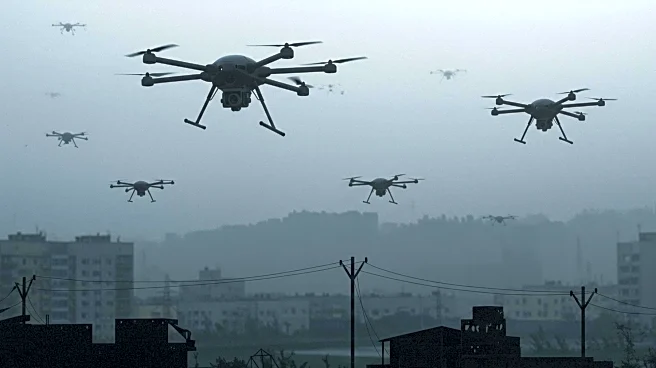What's Happening?
Russia has escalated its drone attacks on Ukraine, targeting cities and civilian infrastructure far from the front lines. The attacks have intensified as Russia increases its production of Shahed-type drones, reportedly manufacturing over 6,000 each month. These drones, which are cheaper to produce domestically than purchasing from Tehran, are used to overwhelm Ukraine's air defenses and demoralize civilians. The attacks have included FPV drones targeting pedestrians, vehicles, and ambulances, particularly in regions close to Russian-controlled areas. Despite Russia's denial of targeting civilians, evidence suggests otherwise, with significant damage reported in cities like Odesa and Kyiv.
Why It's Important?
The escalation in drone warfare highlights a shift in military tactics, emphasizing the use of unmanned vehicles to exert pressure and cause attrition. This development poses a significant challenge to Ukraine, which must respond with more expensive defense measures. The situation also underscores the evolving nature of warfare, where drones play a crucial role in both offensive and defensive strategies. The impact on civilians is profound, with increased fear and stress due to the constant threat of attacks. The broader implications extend to global military strategies, as NATO and other countries may need to adapt their drone capabilities to maintain strategic advantages.
What's Next?
Both Ukraine and Russia are advancing their drone technologies, including AI-powered drones capable of autonomous decision-making. Ukraine is also developing interceptor drones to counter aerial assaults more cost-effectively than missile defense systems. These innovations could alter the dynamics of the conflict, with potential changes in effectiveness and strategy in the coming months. The ongoing adaptation and counter-adaptation cycle between the two nations suggest that technological breakthroughs will continue to shape the conflict's trajectory.
Beyond the Headlines
The use of drones in warfare raises ethical and legal questions, particularly regarding civilian casualties and the targeting of non-combatants. The psychological impact on civilians living under constant threat is significant, affecting mental health and societal stability. Additionally, the proliferation of drone technology could influence non-state actors and criminal organizations, posing challenges to global security and requiring new regulatory frameworks.










